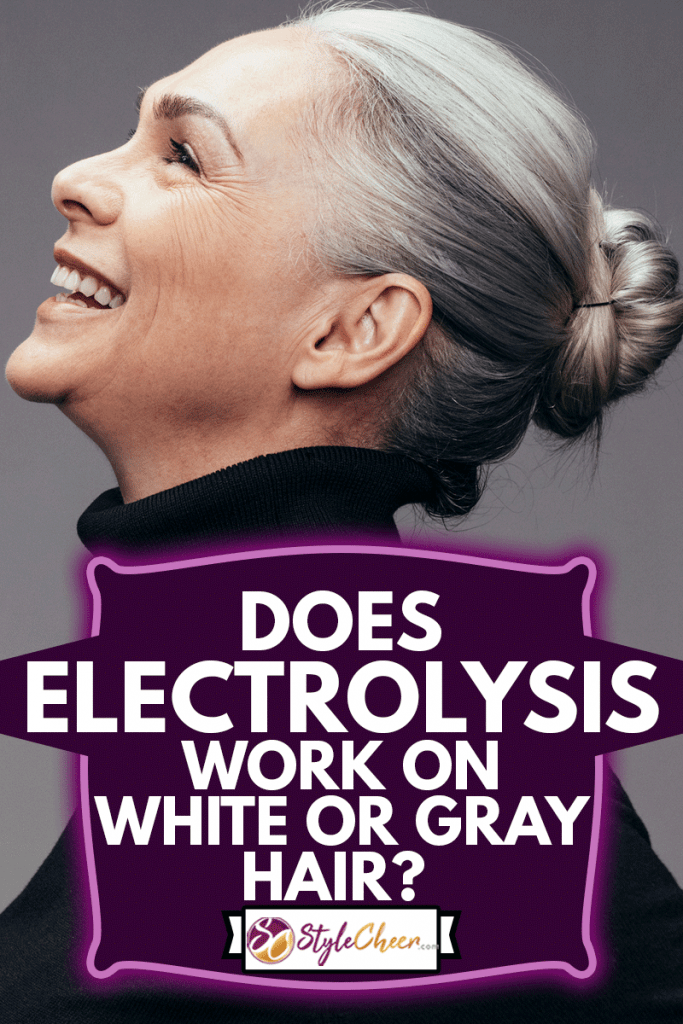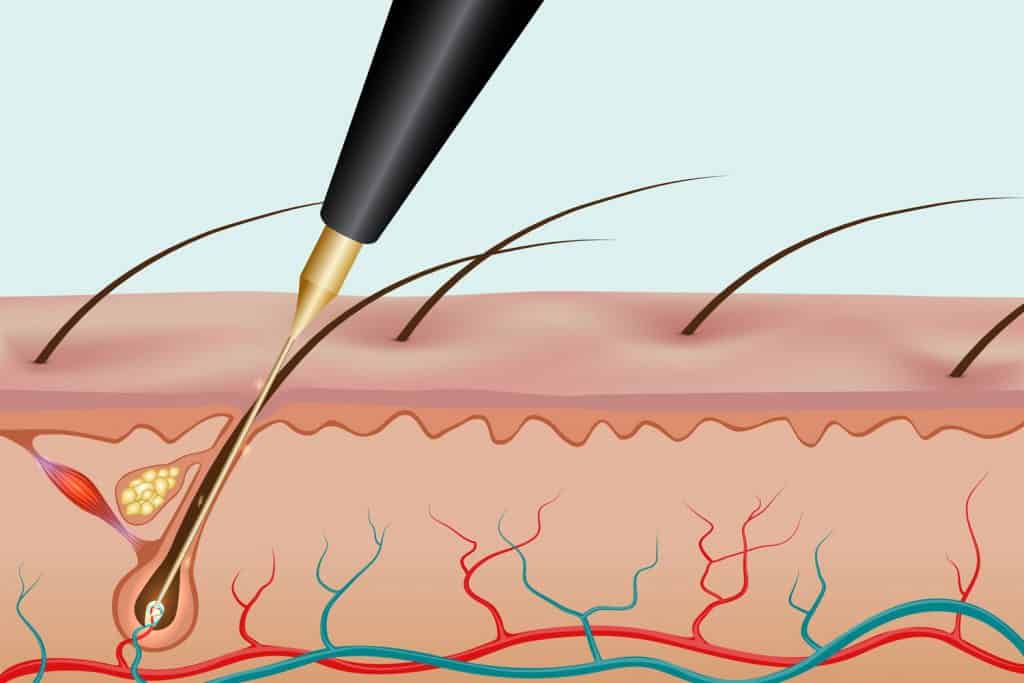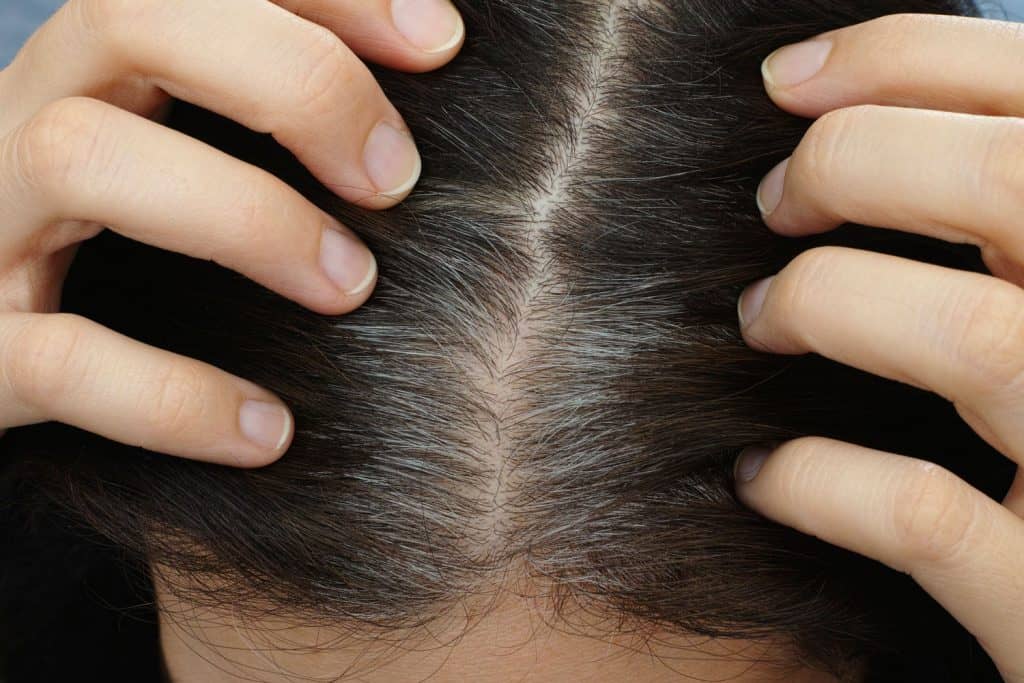Electrolysis, like laser hair removal, is a permanent solution to unwanted hair growth. It destroys the hair follicle so new hair won't grow. However, will it work on white or gray hair? Well, we've done the research to find out and have the answer for you!
Electrolysis does work on white or gray hair. Unlike laser hair removal, electrolysis does not target the pigment in hair, so that it will work for all hair colors and types.
So now you know that electrolysis will work on white or gray hair, but keep reading as we discuss this further. We'll go over whether it's good for facial hair, whether it can damage your skin, and whether it requires multiple treatments. Additionally, we'll answer some general questions you might have about gray and white hair.

This article may include affiliate links and elements that were carefully created by our team using advanced ai to help you envision the best style advice.
How Electrolysis Works
Electrolysis targets the hair follicle beneath the skin. Instead of using light to prevent hair from growing the way laser hair removal does, electrolysis uses short radio waves. A tiny needle is inserted into the hair opening of the hair follicle, and an electrical current is used to destroy the cells that allow the hair to grow. Because it uses radio waves to destroy the hair follicle, it is suitable for any hair type or color.
Laser removal will not work for white, gray, or blonde hair because of the lack of pigment in the hair. Electrolysis is backed by the FDA and is one of the best options for hair removal. The FDA has lots of information on safe hair removal procedures.
Experienced dermatologists are often the best choice when it comes to getting the procedure. However, there are also at-home hair removal kits available as well.

Does electrolysis require multiple treatments?
One of the few cons to electrolysis is that it requires multiple treatments and sessions. Depending on the location and size of the area being treated, it may take up to 30 sessions for hair growth to be completely stopped. If the area has coarse or large hair, it might take longer treatments.
Electrolysis works by using a current to zap the hair follicle; the higher the current, the more effective it is. It is best to be treated with the highest level of current you can stand to reduce the number of times you have to return. The typical time for each treatment ranges between 15 minutes to one hour.
Is electrolysis good for facial hair?
Waxing your lip or plucking unwanted chin hair can get old and bothersome. Fortunately, electrolysis can help put an end to these tedious tasks. Because of its ability to work for any hair or skin type, electrolysis is an excellent way to remove unwanted facial hair. The smaller the area, the fewer sessions typically needed.
Does electrolysis ruin your skin?
Electrolysis can cause slight skin irritation during the procedure. It might turn red, be slightly painful, or be inflamed. However, it has fewer side effects than laser hair removal and is generally safe. In rare cases, scarring can occur. You can use an ice pack after the procedure to help cool any irritated skin.
Be sure to use a licensed professional to avoid the risk of infection. Hydrolysis uses small needles to penetrate the skin; if the technician doesn't use a clean or sterilized needle, there is a risk for infection.
Laser hair removal has a much higher risk of adverse side effects than electrolysis, but neither is entirely risk-free. Electrolysis is typically more painful than laser hair removal, but the level of discomfort differs and depends on the person. If you're worried about the pain during the procedure, you can take an over-the-counter pain reliever beforehand.
Does removing gray hair make more grow?

Seeing your first gray hair can be alarming. You might even be tempted to pull or pluck it out, and we're sure you've heard the saying, "Pull one gray hair, and three more will grow in its place!" So, is this saying true?
Fortunately, the saying is just a myth. Whether you pluck a single gray hair or a single black hair, the way the hair has grown remains the same. Only one strand of hair can grow per hair follicle, so removing gray hair will not make more grow.
Does gray hair eventually turn white?
Gray hair will eventually go white. Imagine a pen running out of ink. This is basically what happens with our hair. As we age, a genetic signal starts telling the cells, called melanocytes, which produce the pigment for our hair color to stop. Grey hair is our hair having less pigment, and white hair is what hair looks like without pigment.
A common thought is that gray hair can be caused by stress. Gray hair is often not caused by stress but rather by our biological clock. Correlation is not always causation, and it just so happens that our hair naturally becomes gray during most people's most stressful years.
If you've decided to embrace your gray hair, check out our other blog posts here for some makeup ideas: 25 Makeup Ideas For Women Over 50 With Gray Hair.
Why is my hair turning white?

There are a few reasons your hair might be turning white. The most common reason is just age and genetics. If you think your hair is turning white way before its time, you might have a medical condition, hormonal imbalance, or vitamin deficiency. Chemicals found in hair dyes and some shampoos might also be to blame.
Age and Genetics
Eventually, everyone's hair turns white, so don't think you are the only one! We touched on this above, but when our melanocytes stop producing pigment, our hair gradually becomes grey until it runs out of melanin altogether and becomes white. There's no way to prevent this from happening, so you can either embrace the change or opt for hair dye.
If you want a general idea about what age you might start turning white, take a look at your parents.
Medical Condition, Hormonal Imbalance, or Vitamin Deficiency
Occasionally gray hair can be caused by something other than age and genetics. Deficiencies in iron or B12 have been known to cause premature graying of hair. Sometimes a hormonal imbalance might be to blame. Other times, medical conditions such as vitiligo also cause hair to gray prematurely.
Chemicals
We are all aware that chemicals are not always good for us, whether our skin or internal organs. Well, this applies to our hair too. There are many chemicals found in hair dyes, shampoos, and other products, but chemicals from smoking and secondhand smoke can also cause our hair to turn white early on.
If you suspect your hair is turning gray for any reason other than age, you should mention it to your doctor. They may be able to help you prevent it. Once hair turns gray, it can be extremely difficult to regain any pigment. If age and genetics are to blame, there is nothing you can do to prevent the gray from developing.
Final Thoughts

Electrolysis is the only FDA-backed hair removal procedure, and unlike laser hair removal, it can work for all hair colors and types. If you have white or gray hair and you want a reliable way to remove it, electrolysis is an excellent option to consider. Hopefully, our article has helped you understand the process of electrolysis and turning gray a little bit more.
If you're still a bit wary about removing your white or grey hair, there are other alternatives. Check out one of our other blog posts on one of the options here: Does Colored Hair Mousse Cover Grey?



